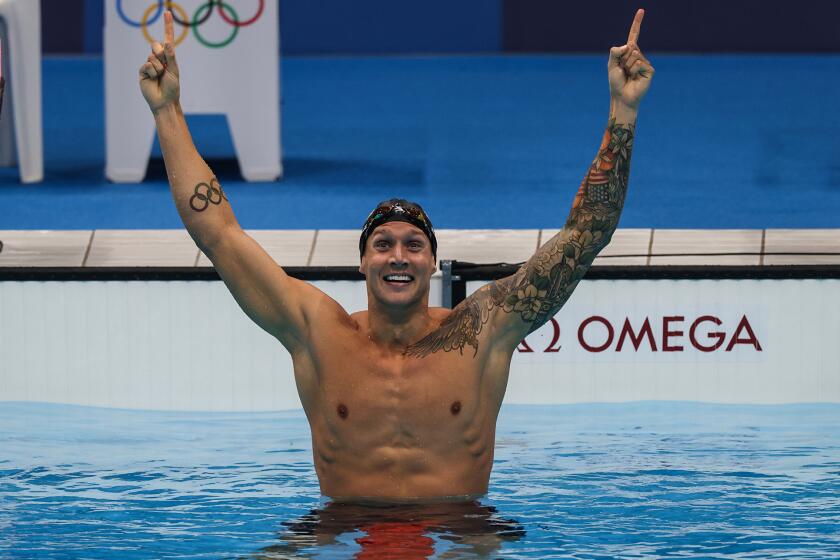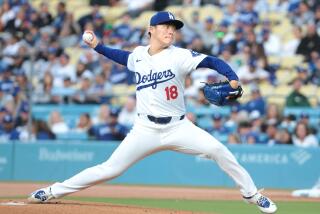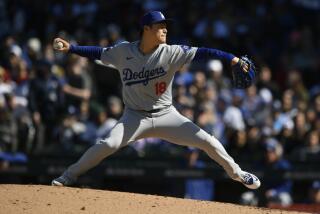Hideki Matsuyama confronted by the privilege, and burden, of playing at home
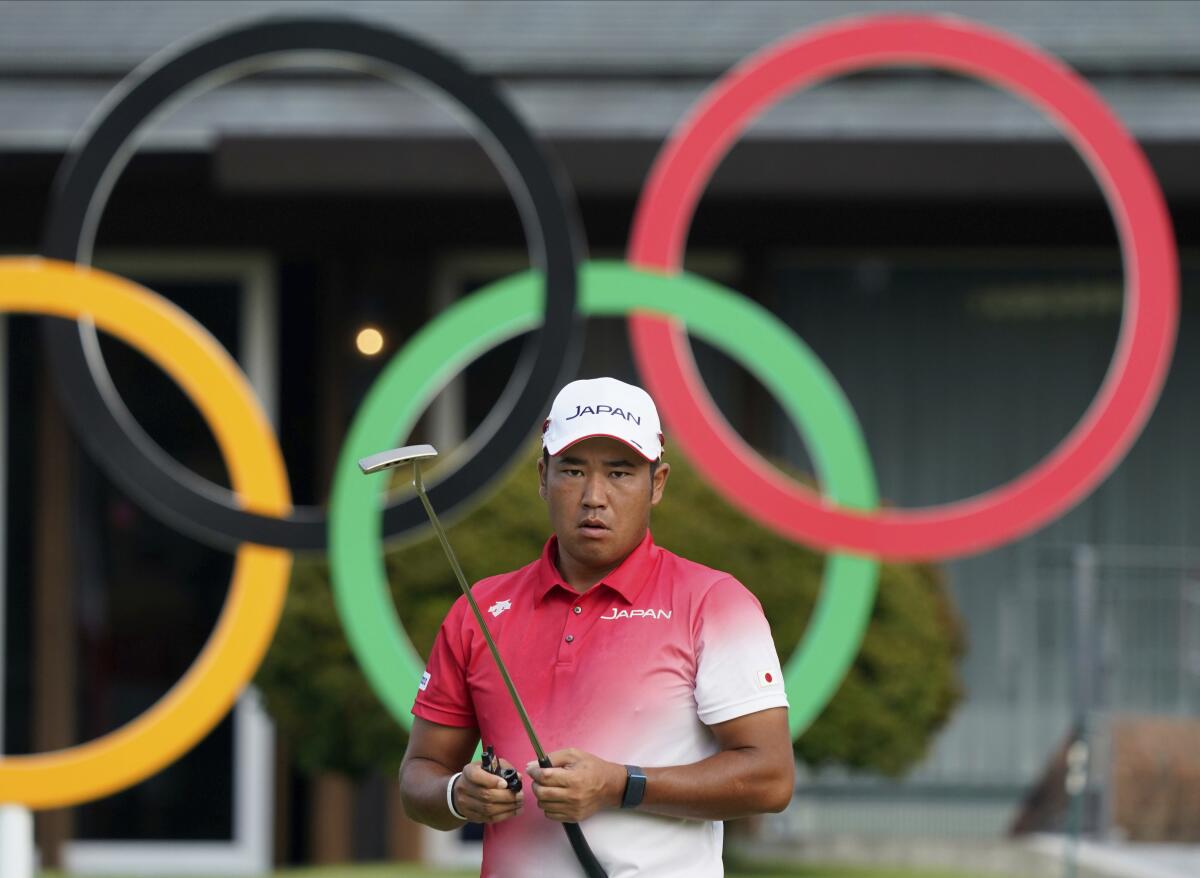
- Share via
TOKYO — As stonefaced as a statue, Hideki Matsuyama listened intently to the questions from the foreign media.
He waited for the translator to repeat the queries in his native language before giving answers about his disappointing opening round in the Tokyo Olympics, his playing in his home country without adoring fans lining the fairways, his return after a nearly monthlong layoff in the wake of a positive test for COVID-19.
One question needed no translation, having accompanied the Japanese sensation like a stubborn postnasal drip since his Masters victory in April: Does he feel any pressure?
“If I said there’s no pressure I would be lying,” Matsuyama said through a translator after not waiting for her to repeat the question in Japanese. “So hopefully I’ll be able to embrace the pressure that’s upon me and just try to put together a nice tournament here.”
In being the natural successor to Michael Phelps, Caeleb Dressel says winning his first individual Olympic gold medal has lifted a heavy burden off him.
He’s not off to a great start. Matsuyama shot a two-under 69 on the East Course at Kasumigaseki Country Club on Thursday, leaving him in a tie for 20th, six shots behind leader Sepp Straka of Austria. Bogeys on the ninth and 11th holes largely offset a strong start in which Matsuyama was four-under after eight holes.
The 29-year-old’s disappointment was evident afterward when he spoke with about 15 Japanese journalists. He gave answers in short sentences, offering little insight, the entire session lasting two minutes.
Matsuyama was slightly more accommodating with a handful of foreign reporters. Their questions focused on the burden he felt to prop up his native country after tennis star Naomi Osaka, who lit the Olympic Stadium cauldron during the opening ceremony as Japan’s biggest luminary in these Summer Games, was upset in the third round of her tournament.
“This experience could be the first and last that I get to play the Olympics in my home country,” Matsuyama said, “so hopefully [Friday] I’ll put together a better round.”
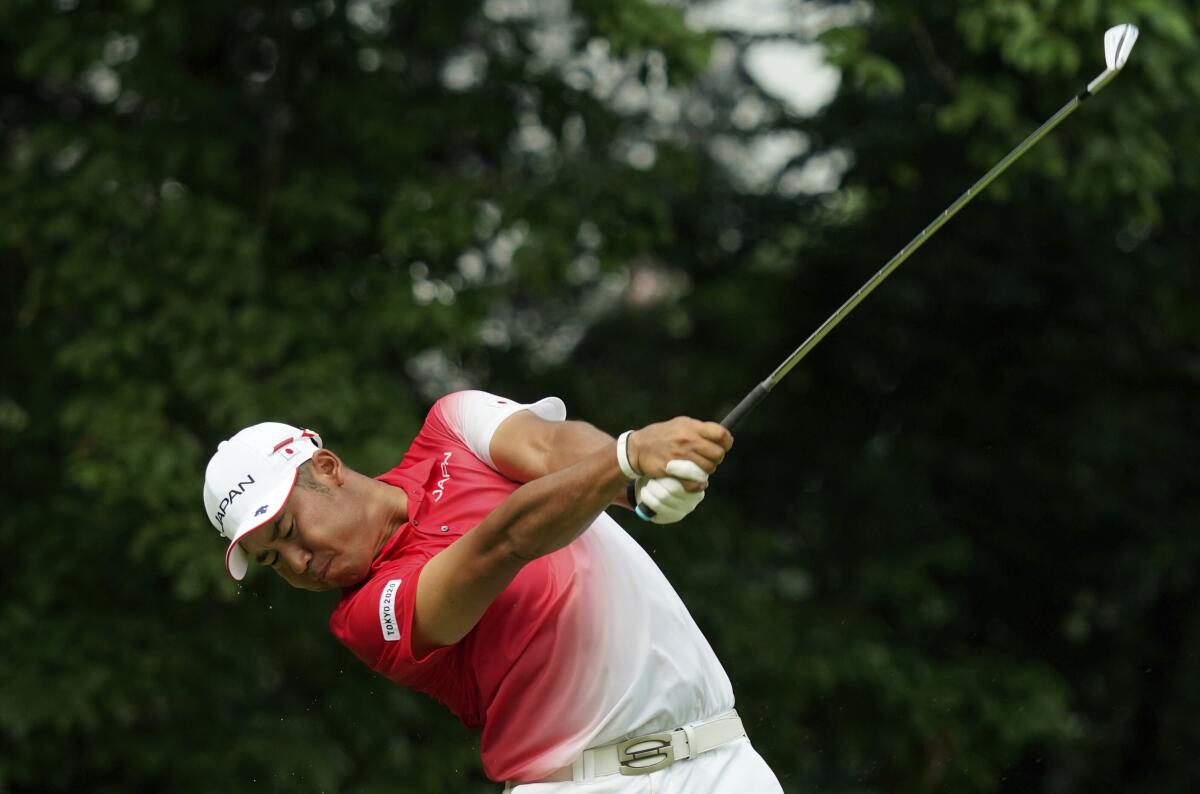
This was supposed to be a triumphant return for a national hero after Matsuyama became the first Japanese player to win a major golf tournament, let alone the Masters. His history on this course made him a natural favorite, having won a junior tournament here in 2009 on the East Course and an amateur event in 2010 on the West Course to secure his first Masters invitation.
That home-course advantage was essentially nullified given what he’s had to endure since slipping on the green jacket at Augusta National. His best finish has been a tie for 23rd at the PGA Championship, and he was forced to withdraw from the Rocket Mortgage Open earlier this month after testing positive for the coronavirus.
That setback hampered his preparations for the Summer Olympics and prevented him from taking an extended victory tour in his home country. Eiko Oizumi, a writer and photographer for Tokyo-based magazine Golf Global, said Matsuyama has attended only one news conference here since the Masters.
Maybe that was for the best given the constant refrain greeting Matsuyama over the last 3½ months.
“He won the Masters and everybody said, ‘Please get a gold medal’ this year in Tokyo,” Oizumi said. “Every time he talked to everybody in Japan, it was like that. ‘Get a gold medal.’ ”
Prevailing in the second Olympic golf tournament since the sport returned to the Summer Games in 2016 in Rio de Janeiro would involve a riveting comeback. Among those Matsuyama must overtake are Patrick Reed, the Texan who shot a three-under 68 to more than validate his presence as the COVID-19 replacement for Bryson DeChambeau.
Fellow American Xander Schauffele matched Reed’s score, and Collin Morikawa, the reigning British Open champion who once starred at La Cañada High, shot a two-under 69.
None will likely feel the strain encumbering Matsuyama in the coming days. Shigeki Maruyama, who’s serving as the coach of the Japanese team, acknowledged the dip in Matsuyama’s endurance since he contracted the virus, calling it “night and day” compared to what it was before.
There’s also that other nagging factor. Like his countryman, Maruyama did not wait for the translator before answering a question about the pressure heaped on Matsuyama.
“Absolutely, yes,” Maruyama said, “the normal tournament, he should be able to play much more comfortably compared to this week.”
More to Read
Go beyond the scoreboard
Get the latest on L.A.'s teams in the daily Sports Report newsletter.
You may occasionally receive promotional content from the Los Angeles Times.

